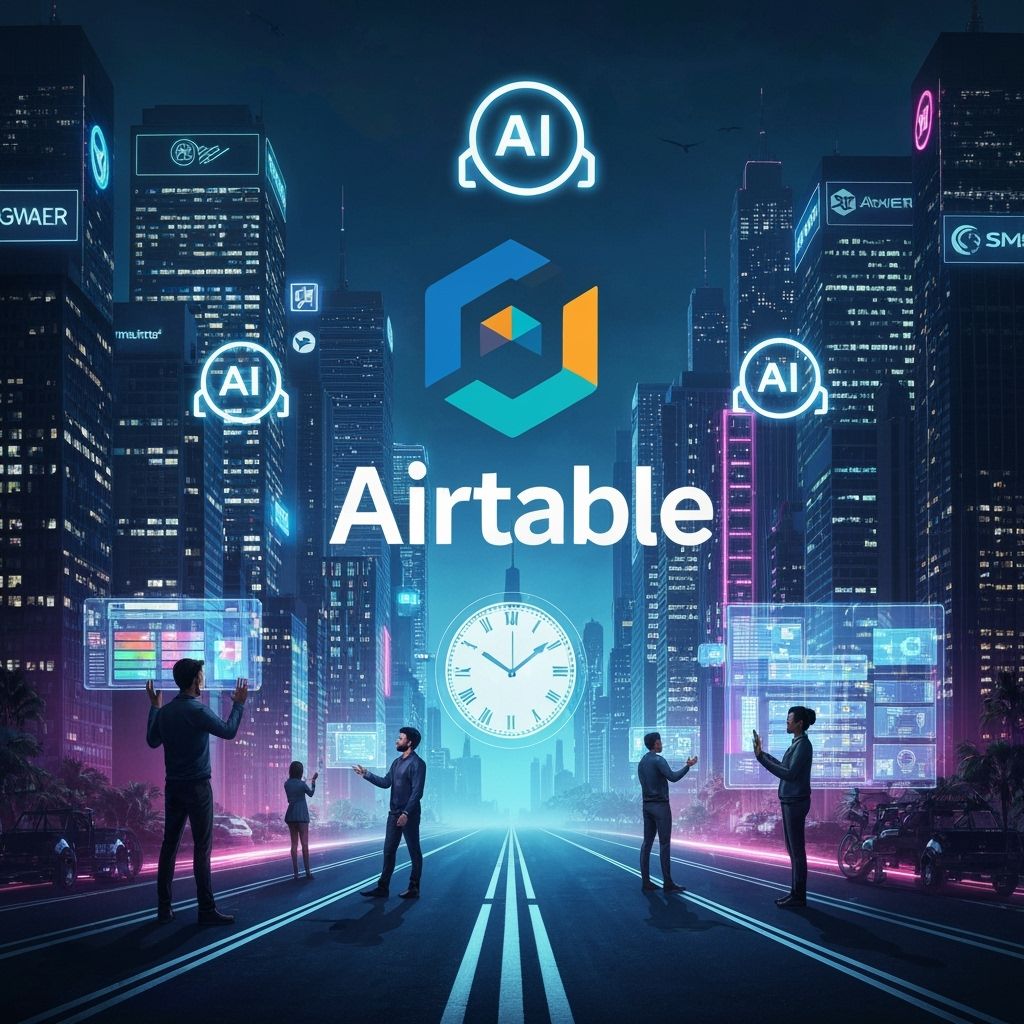In the peculiar realm of Silicon Valley, where logic often takes a backseat to whatever buzzword is trending on Product Hunt, a most curious phenomenon has emerged. Airtable, a company that has somehow convinced investors to part with $1.4 billion for what is essentially a very fancy spreadsheet, has decided that its nearly $400 million in annual recurring revenue simply isn’t exciting enough for 2025.
The company’s latest strategic pivot represents a fascinating case study in corporate FOMO—or what industry insiders now call “Artificial Intelligence Acquisition Anxiety Disorder.” Like Alice tumbling down the rabbit hole, Airtable has chosen to abandon the comfortable world of profitable database management to chase the White Rabbit of AI app building, a market so saturated that even the Mad Hatter would suggest taking a different path.
The Great Database Abandonment
To understand the sheer absurdity of this decision, one must first appreciate what Airtable accomplished in its pre-AI incarnation. The company created what can best be described as “Excel for people who went to liberal arts colleges and refuse to admit they’re just making spreadsheets.” Their platform allowed users to organize data in visually appealing ways, complete with colorful labels and drag-and-drop functionality that made even the most mundane inventory management feel like a creative exercise.
This approach proved remarkably successful. Businesses across industries embraced Airtable’s user-friendly interface, paying premium prices for the privilege of making their databases look like Pinterest boards. The company’s ARR grew to an impressive $400 million, demonstrating that there was indeed a substantial market for aesthetically pleasing data management tools.
But in the Looking Glass world of modern tech, profitability and market fit are apparently less important than having the letters “AI” in your pitch deck. According to internal documents obtained through sources who requested anonymity, Airtable’s leadership team became increasingly concerned that they were being perceived as “just another SaaS company” rather than a “revolutionary AI-first platform.”
The Artificial Intelligence Imperative
The transformation began, as these stories often do, with a series of executive retreats featuring motivational speakers who charge six figures to explain why everything your company does is about to become obsolete. Dr. Marcus Chen, Airtable’s newly appointed Chief AI Transformation Officer, described the company’s epiphany during a recent all-hands meeting: “We realized that organizing data is fundamentally an artificial intelligence problem. Every time someone creates a new field or sorts a column, they’re essentially engaging in machine learning. We’re simply making that process more explicit and monetizable.”
This revelation led to what internal communications referred to as “Project Wonderland”—a comprehensive reimagining of Airtable as an AI app builder. The logic, as explained in a leaked strategy document, was elegantly circular: since all software is becoming AI-powered, and all AI requires data organization, Airtable was uniquely positioned to become the platform where users build AI applications using their existing data.
The plan sounds reasonable until one considers that approximately 347 other companies have announced similar AI app building platforms in the past eighteen months. The market has become so crowded that distinguishing between different AI app builders requires a specialized taxonomy that doesn’t yet exist.
The Pivot Performance
The pivot itself was executed with the kind of choreographed precision that only comes from hiring McKinsey consultants. Overnight, Airtable’s marketing materials were updated to emphasize “intelligent automation,” “predictive data workflows,” and “democratized AI development.” The company’s homepage, which previously featured testimonials from project managers and small business owners, now showcased case studies about “citizen data scientists” and “no-code AI pioneers.”
Sarah Martinez, Airtable’s VP of Strategic Narratives, explained the transition during a recent investor call: “We’re not abandoning our core competencies—we’re amplifying them through the lens of artificial intelligence. Every database becomes a training dataset, every workflow becomes a machine learning pipeline, and every user becomes an AI developer.”
The statement perfectly encapsulates the kind of linguistic alchemy that transforms ordinary business functions into revolutionary technological breakthroughs. Under this framework, a restaurant owner tracking inventory becomes a “retail AI researcher,” and a wedding planner organizing vendor information becomes a “hospitality intelligence architect.”
The Competitive Landscape of Redundancy
Airtable’s entry into the AI app building space comes at a time when the market has achieved what economists might call “peak oversaturation.” The category now includes established players like Zapier (which added AI to its automation platform), Bubble (which integrated AI into its visual programming tools), and Microsoft (which added AI to everything it owns and several things it doesn’t).
The situation has created what industry analysts call “the AI app builder paradox”—a market where every platform claims to be the easiest way to build AI applications, yet none of them can clearly explain what differentiates their approach from the dozens of competitors offering virtually identical services.
Internal competitive analysis documents reveal that Airtable’s leadership team conducted an exhaustive study of the AI app building landscape before deciding to enter it. Their conclusion, as summarized in a presentation titled “Why We’re Different (Even Though We’re Not),” was that while the market was indeed crowded, none of the existing solutions properly leveraged the unique advantages of relational databases.
This reasoning led to the development of what Airtable calls “Database-Native AI Development”—a approach that treats structured data as the foundation for AI applications rather than an afterthought. The concept is theoretically sound, practically challenging, and commercially unproven.
The User Experience Transformation
The pivot has required Airtable to fundamentally reconceptualize its user experience. The familiar interface of tables, forms, and views has been supplemented with new features like “AI Model Training Worksheets,” “Intelligent Automation Orchestrators,” and “Predictive Analytics Dashboards.” Early beta users describe the experience as “Excel meets ChatGPT meets a business school case study.”
The learning curve has proven substantial. Users who previously managed their data through intuitive drag-and-drop interfaces now need to understand concepts like “training data validation,” “model accuracy metrics,” and “deployment pipeline optimization.” Airtable has responded by creating what they call “AI Academy”—a comprehensive training program that promises to transform database administrators into machine learning engineers.
The program’s effectiveness remains unclear, but early feedback suggests that many users are experiencing what psychologists call “cognitive overload.” One anonymous beta tester described the experience as “like being asked to perform brain surgery when you just wanted to organize your stamp collection.”
The Monetization Maze
Perhaps the most intriguing aspect of Airtable’s pivot is how it plans to monetize AI app building while maintaining its existing revenue streams. The company has introduced a tiered pricing structure that charges separately for database storage, AI model training, and application deployment—a system so complex that it requires its own dedicated pricing calculator.
The new model represents a significant departure from Airtable’s previous straightforward per-user pricing. Users now pay based on “compute units,” “model complexity scores,” and “deployment frequency metrics.” The system is designed to scale with usage, but early adopters report difficulty predicting their monthly costs.
Jennifer Walsh, a small business owner who has used Airtable for three years, summarized the pricing challenge: “I used to pay $50 a month to organize my customer data. Now they want me to pay $50 for the database, $30 for AI training, $20 for model hosting, and $15 for each deployed application. I’m not even sure what a deployed application is, but apparently I need seventeen of them.”
The Talent Acquisition Arms Race
Airtable’s AI pivot has triggered what internal documents describe as “aggressive talent acquisition initiatives.” The company has hired dozens of machine learning engineers, data scientists, and AI product managers, many poached from established AI companies with compensation packages that reportedly include equity stakes designed to vest over six years.
The hiring spree has created internal cultural tensions between Airtable’s original team of database and productivity specialists and the new AI-focused employees. Sources describe an environment where traditional product managers struggle to communicate with machine learning engineers, leading to what one insider called “technical and cultural translation challenges.”
The company has responded by implementing what they call “Cross-Functional AI Literacy Programs”—mandatory training sessions designed to help non-technical employees understand AI concepts and help AI specialists understand database management. The sessions, held every Tuesday at 3 PM, have become known internally as “Confusion Meetings.”
The Investor Narrative
From an investor perspective, Airtable’s pivot represents both tremendous opportunity and significant risk. The company’s existing revenue base provides a stable foundation for experimentation, but the AI app building market’s saturation level makes differentiation increasingly difficult.
Recent investor presentations emphasize Airtable’s “unique position at the intersection of data management and AI development.” The company argues that its existing user base represents a built-in market for AI applications, and that its database expertise provides technical advantages that pure-play AI companies lack.
The argument is compelling in theory but faces practical challenges. Many of Airtable’s existing customers express confusion about why they need AI capabilities for their relatively simple data management needs. The company’s challenge is convincing users that they have AI problems they didn’t know they had.
The Future of Organized Chaos
As Airtable continues its transformation into an AI app building platform, the company faces the fundamental challenge of serving two distinct markets simultaneously. Their existing customers need reliable, intuitive database management tools, while their new AI-focused users require sophisticated machine learning capabilities.
The company’s solution involves what they call “Progressive AI Enhancement”—an approach that gradually introduces AI capabilities to existing users while building dedicated AI development tools for new customers. The strategy is ambitious but complex, requiring Airtable to essentially operate as two different companies within a single platform.
Whether this approach will succeed remains to be seen. The AI app building market shows no signs of consolidation, and new competitors enter regularly. Airtable’s challenge is not just building better AI tools, but convincing users that they need AI tools at all.
The company’s journey from profitable database management to speculative AI development represents a broader trend in the tech industry, where even successful companies feel compelled to chase the latest technological trends. In Airtable’s case, the pursuit of AI relevance has led them to abandon the clarity of their original value proposition for the uncertainty of an oversaturated market.
The story continues to unfold, but one thing is certain: in the wonderland of Silicon Valley, even $400 million in annual revenue isn’t enough to resist the gravitational pull of artificial intelligence.
What’s your take on Airtable’s pivot? Are you a current user who’s excited about AI capabilities, or do you think they’re abandoning what made them successful? Have you tried any of the dozens of other AI app builders flooding the market? Share your thoughts on whether this move makes strategic sense or if it’s just another case of profitable companies chasing shiny objects.
Enjoyed this dose of uncomfortable truth? This article is just one layer of the onion.
My new book, “The Subtle Art of Not Giving a Prompt,” is the definitive survival manual for the AI age. It’s a guide to thriving in a world of intelligent machines by first admitting everything you fear is wrong (and probably your fault).
If you want to stop panicking about AI and start using it as a tool for your own liberation, this is the book you need.
>> Get your copy now (eBook & Paperback available) <<




GIPHY App Key not set. Please check settings